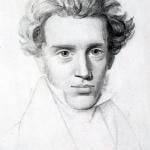A friend, Aaron Cummings, writes in response to my comments about Derrida and prodigal words: “A few days ago, you alluded to Derrida, that words run prodigal from the speaker/writer. You said that this was true of Mankind’s words, but not of God’s. It seems to me that this is true of all word apart from the work of the Spirit. It is the Spirit who conveys the ultimate Word from the ultimate Speaker, to us, who are the Listeners.... Read more
















